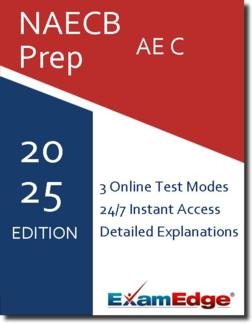NAECB AE-C (AE-C) Practice Tests & Test Prep by Exam Edge - Test Reviews
Based on 29 Reviews
- Real Exam Simulation: Timed questions and matching content build comfort for your NAECB AE-C test day.
- Instant, 24/7 Access: Web-based NAECB Asthma Educator practice exams with no software needed.
- Clear Explanations: Step-by-step answers and explanations for your NAECB exam to strengthen understanding.
- Boosted Confidence: Reduces anxiety and improves test-taking skills to ace your NAECB Asthma Educator (AE-C).

NAECB AE-C (AE-C) Practice Tests & Test Prep by Exam Edge - Review
NAECB Asthma Educator - Reviews
Excellent
Based on
145
reviews
“ Not even close to anything they ask on most questions. Don't waste your money
Todd , berwick, Pennsylvania
See why our users from 154 countries love us for their exam prep! Including 29 reviews for the NAECB AE-C exam.
Exam Edge is an Industry Leader in Online Test Prep. We work with our Institutional Partners to offer a wide array of practice tests that will help you prepare for your big exam. No Matter how niche field of interest might be, were here to help you prepare for your test day.
| 2.8M | 4.5M | |
| Users | Tests Taken | |
| 100K | 19 | |
| Unique Exams | Years in Business | |


